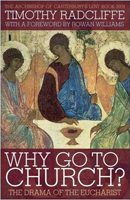Why Go to Church? The Drama of the Eucharist
By Timothy Radcliffe, O.P. (Continuum, 2009)
In the face of our “spiritual but not religious” and institution-wary culture, Timothy Radcliffe, the English Dominican, explains why going to church is so much more than participating in an archaic tradition. In this book Radcliffe explores how the Eucharist recreates the drama of human existence, which unfolds slowly throughout our life. The gift of the Eucharist is not a gift of instant gratification but one that gradually transforms us.
Radcliffe sets up the book in three acts: faith, hope, and love. Through each of the acts he reflects on different parts of the Mass. He uses the Annunciation story to explore faith. Then he follows the structure of the liturgy from the preparation of the gifts to the Eucharistic Prayer to discuss hope. The stories of the risen Christ in John’s gospel are used to understand love.
While Radcliffe uses contemporary cultural references (at one point he even concludes that Aragorn from The Lord of the Rings was a Dominican), he is careful to separate our faith from society’s emphasis on individualism and consumerism. Throughout the book, community is emphasized over individual: We may come to church with our own problems, but we leave as part of the whole. We are also tied to the community of believers who have gone before.
Radcliffe often returns to the theme of emptiness. We can’t fill our emptiness by buying more stuff. Instead, we bring our emptiness to church and know that God will fill us up with the Body of Christ.
Radcliffe packs each paragraph with so much information that you have to read the book slowly to take everything in. But this is not a complex theological tome, nor is it a trivial self-help book on personal spirituality. Radcliffe uses popular culture and spiritual writings to try to reconnect us with our core, our intimate relationship with God through the Eucharist and through the community of believers. This is why we go to church.














Add comment